8: Even as Baby Boomer children, we grew up so fast…
Brian R. Wright
Note: These columns are a series, I will make into a volume of my memoirs. You may follow the links at top and bottom of page to go to preceding or succeeding episodes. The series starts here. {If the [Link to Episode <next>] at the bottom of the column does not show an active hyperlink, then the <next> column has yet to be written.}
The ages 6 to 11, corresponding to 1st grade to 6th grade, respectively, are a blur in retrospect. You can see from the way I framed the first sentence that the mandatory school environment became a defining part of my ‘Wonder Bread’ years. It doesn’t take very long, even for the more independent minded, to succumb to the standardized BIG worldview we were all being injected with… and expected to conform to. As director Christof says about Truman Burbank in the movie The Truman Show (1998):
“We accept the reality with which we’re presented.”
More about the Conformity Legacy as we go. I do remember my first grade teacher’s name, Miss Wood. I considered her quite pretty, slim, etc., but she was more insistent than my kindergarten teacher on the rules and sticking to them. In kindergarten and first grade, we had sleep ‘rugs’ for class-all-in-one napping—I disdained all such naps. We were also instructed on occasion to sleep at our desks with our heads down. One day, I demurred. Miss Wood came over to my desk and tried to force my head down, none too gently either. I hauled off and hit her on the arm. She then slapped me a good one on my cute little face; I complied. Next day during the floor nap I looked up her dress. 🙂
Thankfully, my life was rich outside of the forced-school setting. The photo above-right shows my brother Forrest (~6 years old) and me (~7) with a large box kite that Dad had helped us to make, and then fly into the bright Kansas skies. I tell you it was quite an operation for that sail area, requiring a steady eye and a firm grip on the custom-made spool, with sturdy twine.
Memory escapes me on just how long the kite lasted, whether it got away from us kids or whether Dad—it was clear he loved that kite as much or more than we did—grew tired of Mom’s protests that it was just too big and if it tangled up around one of us kids’ legs, said kid would go airborne and be killed by a long fall, etc. So he disassembled it. For quite a while, Dad’s Big Kite was the talk of the neighborhood.
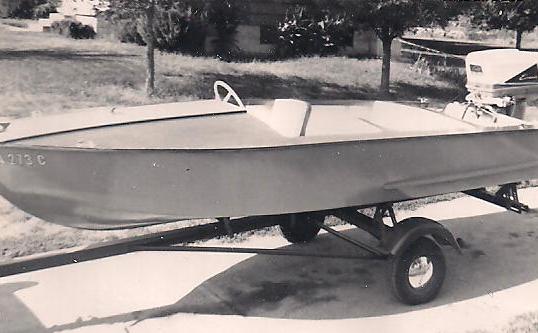 The boat picture here gives you an even better idea of what my father was like, what floated his boat, so to speak—when he wasn’t working the 9-to-5+ as a traveling salesman in a territory that extended out to Dodge City, some 325 miles away… with a bad back. This in the days before interstate highways and before air conditioners became standard equipment in automobiles. [The company did buy him an add-on AC, he had one of the first of those for cars.] Dad loved to fly, yet that lifelong dream was tainted by the war; in lieu of flying, in his free time, he loved to do exciting and adventurous things in general.
The boat picture here gives you an even better idea of what my father was like, what floated his boat, so to speak—when he wasn’t working the 9-to-5+ as a traveling salesman in a territory that extended out to Dodge City, some 325 miles away… with a bad back. This in the days before interstate highways and before air conditioners became standard equipment in automobiles. [The company did buy him an add-on AC, he had one of the first of those for cars.] Dad loved to fly, yet that lifelong dream was tainted by the war; in lieu of flying, in his free time, he loved to do exciting and adventurous things in general.
Plus he took enormous pride in workmanship. He built the water craft above with his own hands, carefully molding the fiber glass hull in our garage, then covering with a genuine mahogany veneer painstakingly sanded, stained, and finished. It was a work of art, for sure, which took him several months to finish. It was closer to the end of my Golden Memory window when he began the project, perhaps I’m 11 years old in sixth grade.
The nearest larger lakes where we could put in were in Missouri. Lake of the Ozarks, about 150 miles away, was the major water playground for all of eastern Kansas, eastern Missouri, too. Which limited our family boat time to long weekends or annual vacations, in other words, to not much. Forrest and I learned to swim very early—we had a member-ship to the Overland Park Pool off of 75th street—as both my parents were excellent swimmers with exceptional athletic ability and coordination.
Special Note: We’re talking about ol’ Pop here mainly, and you have to realize that Dad not only had his personal hobbies and interests, he was thoroughly devoted to us kids (and to Mama Bear, too, of course). He was a Cub Scout leader, like an officer of the pack or something. He also led the community to create the Johnson County 3&2 Baseball League for boys, in which he managed the team that we played for—selling the esteemed owner, Ernie, of a local Skelly gas station, on becoming our sponsor. Dad was gregarious, funny, and a natural leader. He could sell snow to the Eskimos. I idolized him.
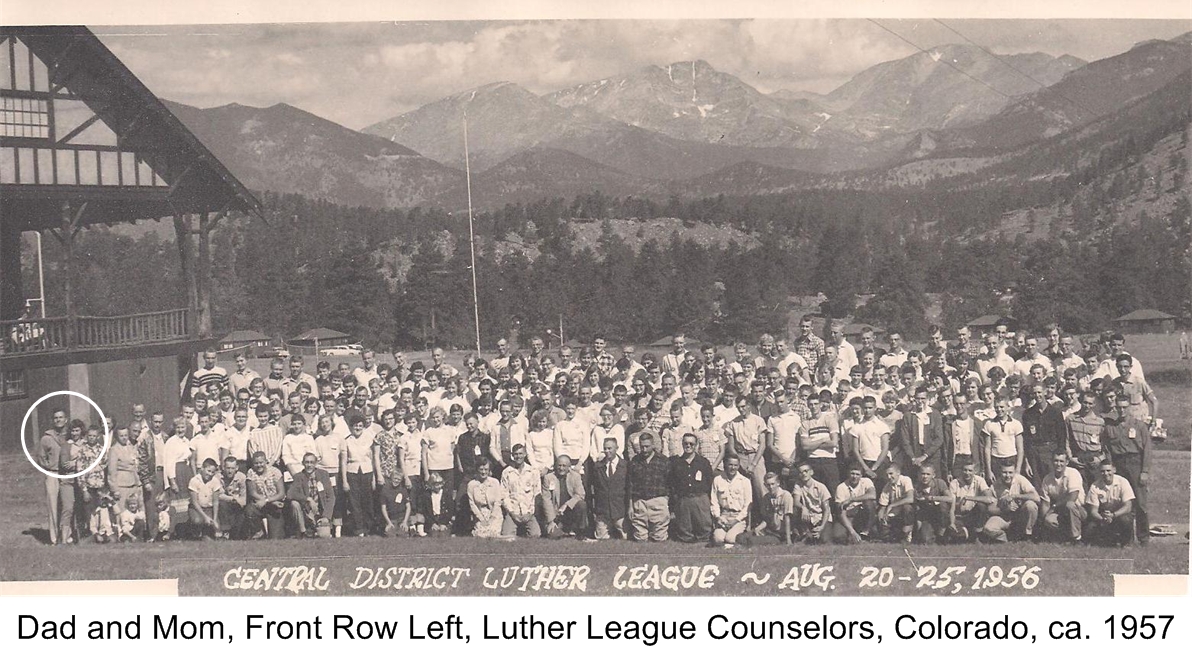 Dad laid down my morality: be completely honest and stand up for what is true and right, regardless of the body count against you. Mom was no slouch either. Apart from what I’ve already mentioned, she, for several years, was the president of my grade school’s Parent Teacher Association (PTA)… which means, basically, she wasn’t going to deliver her kids to just any humdrum bureaucrats, without holding various someones’ feet to the flames if they didn’t do their jobs.
Dad laid down my morality: be completely honest and stand up for what is true and right, regardless of the body count against you. Mom was no slouch either. Apart from what I’ve already mentioned, she, for several years, was the president of my grade school’s Parent Teacher Association (PTA)… which means, basically, she wasn’t going to deliver her kids to just any humdrum bureaucrats, without holding various someones’ feet to the flames if they didn’t do their jobs.
Sorry, too much lionizing the parents. They did have their downsides, but nothing major. They believed in corporal punishment for one thing, which people take different sides on, but in our case it was rare and usually understandable. I think I got a leather-belt spanking from Dad once after I had shot dirt at my brother’s face from my air rifle… and he did the same thing to my brother when Forrest threw a hammer at my head in the basement. But Dad’s heart was just not into physical punishment, mostly it was two or three pseudo-whacks to give the appearance of harshness. [Come to think of it, with Mom, the punishment was frequent, because I was a born-again smart aleck and she would slap me (hard) whenever I crossed the line of rudeness in talking back to her.]
We were taught to speak respectfully and not to use profanity—as soon as we learned what profanity was. Once, maybe eight or nine years old, when I was outdoors within earshot of my dad, I uttered the word, “hell,” without any clever context; I just wanted to sound cool and hip. Well, Dad sternly told me we just don’t use that word.[1] Also right around that time, indoors, I said the Ralphie (of the Christmas Story) mother of bad words, f***, mainly as a gesture of disgust… for having to take a nap or something. Well, my f-word, elicited a) disapproval, then, from him, because I didn’t know what it meant, b) my first and only lecture on the birds and bees. [Really, quite embarrassing for everyone I’m sure, because Mom was sitting nearby and it was fairly clinical, talking about a man’s genitals getting hard ‘n’ stuff. And how it still felt very GOOD. Which I couldn’t yet relate to.]
Two Illustrative ‘Old Man’ Stories
No way I can tell all the best stories, or do justice to to the ones I do tell. A lot of the best family stories stem from the old man, so to speak. My dad was the aspiring white-collar version of celebrated author Jean Shepherd’s[2] blue-collar father, also referred to as the ‘old man.’ [Or even a little bit of Ralph Kramden of The Honeymooners TV show. That’s a pretty good likeness for sure, especially as Dad often came up with a ‘wild and crazy’ idea, and in his later years he would put on the Jackie Gleason girth.] Let me just leave you with two of the more memorable memories thanks to Pop. Here’s to you, magnificent sir.
the Pinewood Derby
This outside-the-box-idea was to bend the rules a little bit to put Forrest and me into the winner’s circle of the Pinewood Derby. The Pinewood Derby is a Cub Scout (of the Boy Scouts of America) annual ritual very similar to the Soap Box Derby, where kids build and race non-motorized cars down a ramp… except the Pinewood Derby cars are the size of model kit cars. [Soap Box Derby cars you actually sit in.] Somewhere in our Cub Scout years, what, first grade to sixth grade, Dad encouraged us to compete. It didn’t take much 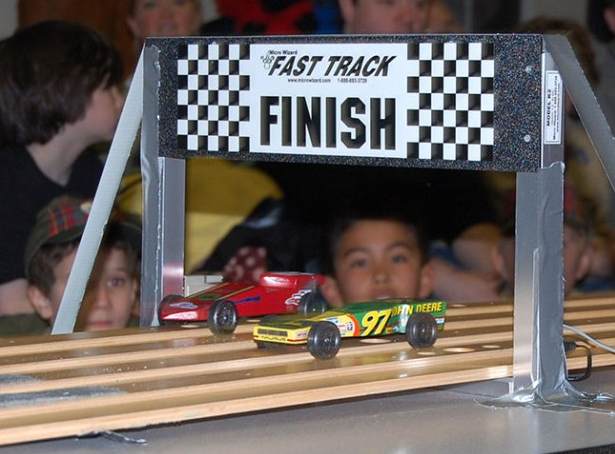 arm twisting—both Forrest and I, following in Dad’s footsteps and in the customs of the time, relished the building of model kits of cars and planes.
arm twisting—both Forrest and I, following in Dad’s footsteps and in the customs of the time, relished the building of model kits of cars and planes.
We took part in the Pinewood Derby several years. One time, after Dad purchased his prized Sears and Roe-buck-branded combination machine, the Shopsmith,™ he wanted to do something that would stand out, not to mention win the event at our local Cub pack school auditorium. The Pinewood Derby ‘kit’ is basically a rectangular solid block of wood for the body, with wheels, tires, metal axle rods, and little blocks of wood to hold the axles. Most kids use a combination of cutting and carving tools to whittle the wood parts into some aerodynamic shape, then sand it and paint it and slap a number decal on the body. Some kids just leave it all square. It’s not about winning the race, it’s about doing something together with your father (that will eventually get you to buy more cars.) 🙂
Seriously, it’s a wholesome activity for boys and fathers, and if the kid is lucky, ol’ dad has some power tools to lend to the task. Neither Forrest nor I really cared too much about how the car actually did on race day, it was just nice to have the old man give us some tips and be there in the construction process.
THIS year was going to be different. Dad, while giving lip service to the Boy’s Life ideals of the Derby, decided to build our cars a class apart. How? Mainly by using his Shopsmith, the lathe and drill parts, to turn the body piece and integrate the axle blocks. I’m not sure what he did, frankly, but my car came out a streamlined Formula-1-looking, metallic blue with dark red trim, beauty, with like a one-inch diameter hole down the entire length of the body. My main contribution was to pick the color scheme. Brother Forrest, chose the yellow-with-wide-black-racing-stripe motif; on his ‘projectile’ Dad drilled two cigar-sized holes thru Forrest’s car body, which somehow he formed to a flattened oval cross-section.
I have no doubt Papa boned up on aerodynamics, all surfaces were smooth as a baby’s behind. They were definitely objets d’art, they looked like they were moving while sitting still. Pretty sure he also tricked out the moving components somehow to reduce friction, but he refused to talk to the reporters. Well, we won, at least one of us did, I can’t remember which, and the one who did win won by several lengths. The one who didn’t win came in second. I believe ol’ pop caught some flack from the rules committee and for not complying with the spirit of the boys’ hallowed event. At the same time, the other boys’ fathers were somewhat in awe of these masterpieces Dad had wrought.
Not sure what moral point I came away with, but I wasn’t going to make a big deal of it.
Ernie’s Skelly
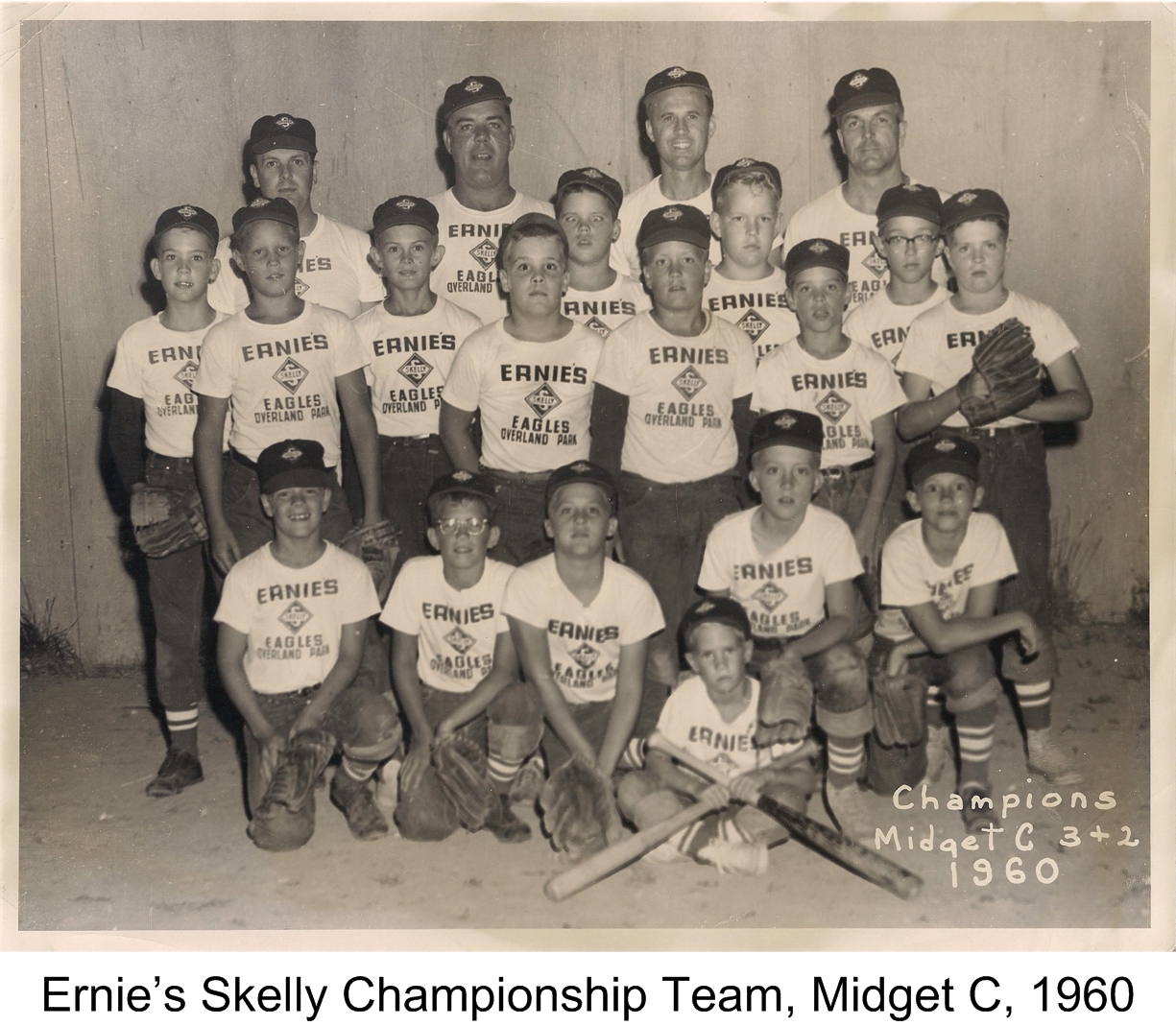 In a similar vein to the Pinewood Derby escapade, Dad wanted to go beyond customary 3&2 baseball manager behavior for the 4th and 5th grader boys’ teams. After the first year, when Ernie’s Skelly did well but did not make the playoff with the other ‘pennant’ winner, he actually went out and recruited! The name of the recruitee was Warren something (Anderson rings a bell). Warren was on the team that had edged us out; he had a delivery that was smooth as silk, with exceptional control for that age. He threw strikes and got outs. [Warren is the third boy from the left in the second row in the photo above. My stocky-frame persona is two kids right of him.]
In a similar vein to the Pinewood Derby escapade, Dad wanted to go beyond customary 3&2 baseball manager behavior for the 4th and 5th grader boys’ teams. After the first year, when Ernie’s Skelly did well but did not make the playoff with the other ‘pennant’ winner, he actually went out and recruited! The name of the recruitee was Warren something (Anderson rings a bell). Warren was on the team that had edged us out; he had a delivery that was smooth as silk, with exceptional control for that age. He threw strikes and got outs. [Warren is the third boy from the left in the second row in the photo above. My stocky-frame persona is two kids right of him.]
Warren lived in a neighborhood away from most of us, and attended a different school. One of the coaches and his son actually lived a block away from Warren’s home, so that coach set up the interview process with Warren’s parents. I remember tagging along for the sales pitch. Dad had done his homework and knew he was within the rules to present the option of Warren’s joining Ernie’s Skelly for what looked on paper to be a run-the-table season. As I said, Dad was a super salesman and touched all the bases. They filled out whatever paperwork was needed, and sure enough: we won the whole enchilada next year, I don’t think we lost a single game.
Now THIS was something I took great pride in. I loved baseball, read every baseball player biography I could check out of the library, and wanted to play professionally. Winning that league in the summer I turned 11 was a high point in my young life. So even though Dad had in effect stacked the deck in our favor, he didn’t do anything outside the rules… what it showed was initiative and imagination, and the will to WIN. We worked hard as a team, we sweat bullets together, right to the final out and the ensuing celebration. We deserved our trophies and jackets. As a peak experience how do you beat such winning?!
Not too many years later, it became obvious that winning, at least for me, wasn’t going to be a regular experience, not in sports anyway. I did win a Spanish III award in high school, and made the varsity baseball team at Putnam City High… during my often downcast and acne-filled Oklahoma City years. I guess the cynical philosopher will tell you that it’s best to win early, so you have plenty of time to get used to losing like everyone else. I came to see it a different way: instead I set high ideals and adopted more of a Big Picture of success: one that attached a winning attitude via a succession of ‘little victories.’
[1] Later down in Oklahoma City, I attended your typically WASPish high school—all white until in my junior year it was reported, with modest alarm in some quarters, that a black girl had enrolled. To give you an idea of the cultural racism, when the school assembly would say the Pledge of Allegiance, many of the leading athletes would finish, “… one nation, under God, with liberty and justice for all [sotto voce: ‘except Negroes’ (only they didn’t say Negroes)].” Being socially liberal, I wouldn’t say that, or even think it. But there were incidents when our football and basketball teams played the black high school, Douglas, and I became more morally lax in my language toward my junior year.
We’d just played Douglas at home in basketball—my Putnam City had a pretty good team, looking to go to state that year—and I had attended the game Friday night with friends. Saturday, at the breakfast table I talked about a great play under the backboard, and I said something like, “… then Standish (our center) goes to the hoop with these two big Negroes (only I didn’t say Negroes) hanging on him….” Well, you could have heard a pin drop. Dad: “What did you just say?!” He basically read me the riot act, but in a tone that took the moral high road and caused me to feel a deep regret and even disgrace. I admitted right there that he was right, that any sort of racial slur was not something a good person did, certainly not his number one son. I apologized from the heart and it never happened again.
[Note: If Dad had got ahold of a program from the game, and could have figured out who the two Douglas players were, I have no doubt we’d have gotten in his car straightaway and he’d have driven me down to that end of town, and gone door-to-door or asked around ’til we found their homes. Then I’d have stepped to the door to formally apologize to them in person, before their mothers and fathers and family pets. What does that tell you about my father… and yours truly? On more than one occasion I was obliged by him to fess up. We’ll get to a couple of the more notable instances in subsequent chapters.] (Touch God.)
[2] Jean Shepherd is the American author and humorist who wrote the book that the celebrated movie The Christmas Story (1983) comes from In God We Trust, All Others Pay Cash. But many of the insightful stories of Shepherd’s father’s exploits are in the funniest of funny books, Wanda Hickey’s Night of Golden Memories (1971).
This post has been read 1716 times!

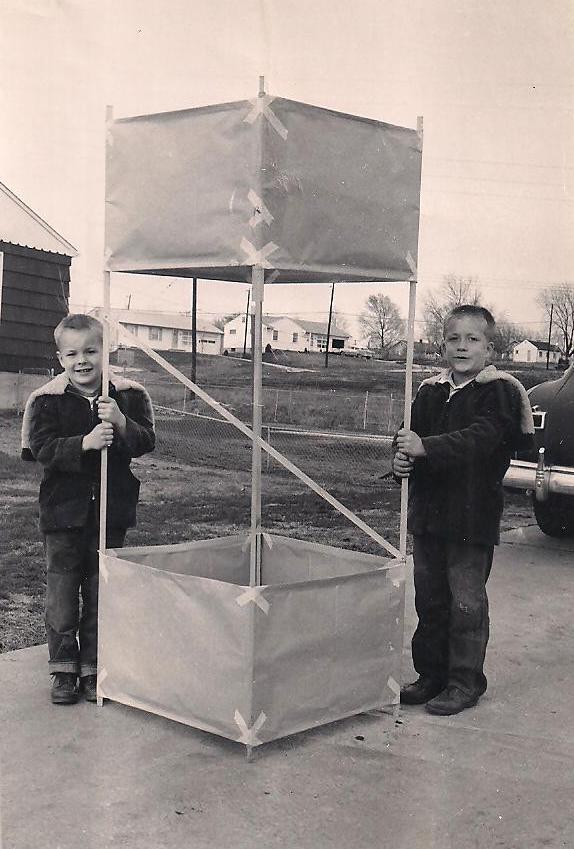
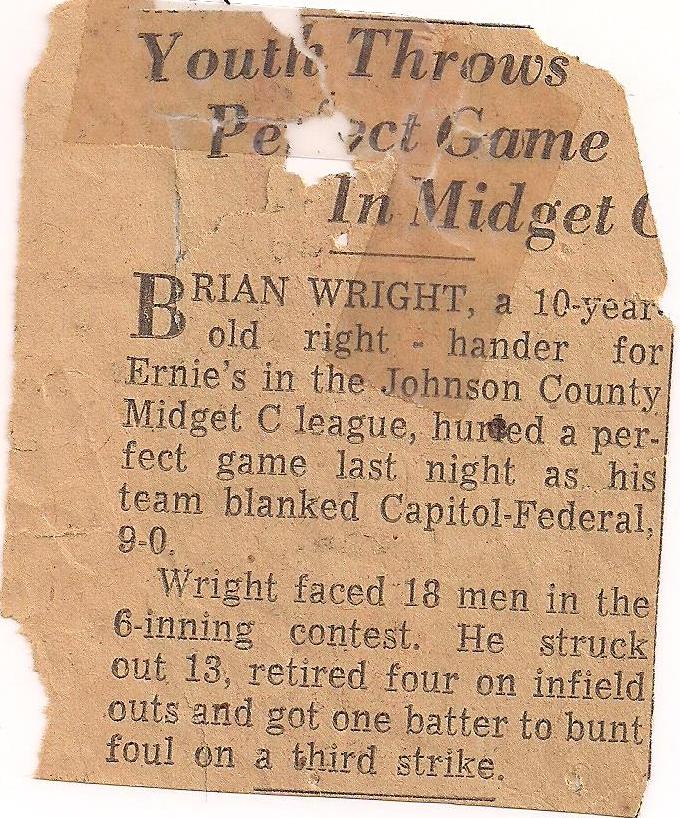

Hi Brian,
I’m the Warren in your column. I just sent an email to what I thought was your correct email address ( bwrightworks@brianwright.com ) but it came back as undelivered. Is there another email address that I can use?